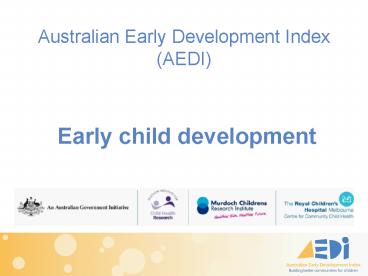Early child development PowerPoint PPT Presentation
1 / 13
Title: Early child development
1
Early child development
Australian Early Development Index (AEDI)
2
Every child deserves the best start in life
3
What happens in the early years matters!
- A society that is good to children is one with
the smallest possible inequalities for children,
with the vast majority of them having the same
opportunities from birth for health, education,
inclusion and participation - (Stanley, Richardson Prior, 2005).
4
Major challenges facing Australian society
- Mental health problems
- Family violence
- Aggressive and anti-social behaviour
- Crime
- Poor literacy
- Skills shortages
- Welfare dependency
- Substance abuse
- Obesity and its associations
5
Many health and wellbeing problems in adults
begin in pathways that start much earlier in the
life cycle, often in early childhood.
6
Both nature and nurture (genes and environment)
influence our childrens development
7
The early years are important
- Brain architecture and skills are built in a
hierarchical bottom-up sequence. - The foundations important higher level circuits
are built on lower level circuits. - Skills beget skills the development of higher
order skills is much more difficult if the lower
level circuits are not wired properly. - Plasticity of the brain decreases over time and
brain circuits stabilise, so it is much harder to
alter later. - It is biologically and economically more
efficient to get things right the first time.
8
The early childhood ecology
9
Risk and protective factors in early childhood
Protective factors Risk Factors
Child Social skills Attachment to family Independence Delayed development Difficult temperament
Immediate family and household Competent stable care Breast feeding Adequate family income housing Lack of warmth affection Physical or mental illness (e.g. depression) Family instability, conflict or violence
10
Risk and protective factors in early childhood
Protective factors Risk Factors
Kinship informal networks Positive, supportive relationships with extended family, friends neighbours Cultural faith-based networks Isolation Absence of peer and social supports
11
Risk and protective factors in early childhood
Protective factors Risk Factors
Community environments, networks formal services Positive, supportive relationships with teachers community professionals Participation in community activities (e.g. sport, recreation, church) Accessibility of community services Freedom from discrimination (e.g. racism, sexism) Inadequate housing Socio-economic disadvantage
12
Risk and protective factors in early childhood
Protective factors Risk Factors
Broader economic, policy, political, social environmental influences Child and family friendly public policies High quality universal programs (e.g. health care, early childhood education and care) Environmental conditions (e.g. drought, flooding) Unstable economic conditions (e.g. unemployment)
13
- Optimal early childhood development supports
success at school and life

